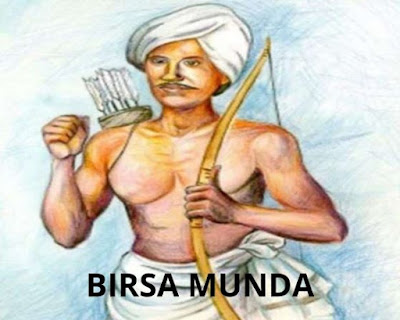BIRSA MUNDA : THE TRIBAL HERO, WARRIOR & GOD
BIRTH OF BIRSA MUNDA-
Birsa Munda was born on 15 November 1875 at Ulihatu village of Lohardaga district of Bengal Presidency which is now known as Khunti district in Ranchi, Jharkhand.
His parent's name was Karmi Hatu and Sugna Munda. He was born on Thursday, in Hindi which is known as 'Brihaspativar', and therefore upon the name of the day he was named Birsa.
EARLY LIFE OF BIRSA MUNDA-
Due to poverty, Birsa Munda was sent to his maternal uncle's village Ayubhatu, and there he stayed for two years, and then at Salga village, he started going to school. The school used to run by Jaipal Nag.
He was very bright in studies, so Jaipal Nag recommended him to join German Mission School but to get admission he was forcefully converted to Christianity. He was named Birsa David, which later became Birsa Daud.
However, he opted out of the school and ceased to be a Christian in 1890.
FORMATION TO A WARRIOR-
He had spent a large part of his life in Chaibasa (Jharkhand) where Sardars agitation was going on against the British which had a great impact upon him and soon he was able to understand British intentions Also, various revolts in the past like the Chuad revolt 1767, Chera Revolt 1771, Tamar Revolt 1782, Kol Revolt, 1820, Santhal revolt in 1855, etc. had a significant upon him.
From here, he became a part of the anti-missionary and anti-government program.
REASONS FOR THE REVOLT BY BIRSA MUNDA-
1. The Munda tribe used to follow khuntkutti system of joint landholding which was abolished by Britishers and lead to imposing Zamindari system upon the tribal farmers.
2. Tribals could not generate surplus produce to give as tax to the Britishers which then lead to giving off the land of the tribals by the Britishers to the non-tribal peasantry, also known as Dikus. This led to the alienation of the lands held by the tribals.
3. An act was also passed in 1882, the Indian Forest Act, that snatched forest areas from the tribals which were their home.
4. And ultimately, after seeing all these sufferings of people of his own community and the poverty faced by them, he decided to start a revolt which was known as 'Ulgulan'.
BIRSA AS GOD & FATHER OF EARTH-
1. Birsa was not only revolting against the Britishers, he was also raising voice against the social evils within his own community like witchcraft, sorcery, etc. He also asked people not to consume liquor.
2. Birsa declared himself as the prophet of God who has come to this earth to end the sufferings of people.
3. He pushed the idea of 'One God' and asked his fellowmen to follow and pray to only one god.
4. He also advised people to follow purity, austerity, and prohibit cow slaughter.
5. He said that the reign of Queen Victoria is over, and now the Munda raj had begun.
6. He was called by the title ' Dharti Aaba' or 'Father of Earth', who had come to end their sufferings.
7. Birsa, by calling himself a prophet of God, started a new religion called 'Birsait'. The religion believed in one god and encouraged tribals to revert to their original religious beliefs by shunning the practices of Christian Missionaries.
8. People who belonged to Oraon and Munda tribes were convinced of this religion and became 'Birsaities'.
DEATH OF BIRSA-
On 9 June 1900, Birsa Munda died in jail.
He was captured and kept in jail for the 1900 revolt by him against Britishers, in which there are approximately 400 people were killed.
IMPACT OF BIRSA MUNDA-
After 8 years of the death of Birsa Munda, the Britishers introduced the Chhotanagpur Tenancy Act, which prohibited the transfer of tribal lands to Dikur or non-tribals.
It also protected the propriety right of owners.
A century after his death, on 15 November 2000, Jharkhand was separated from Bihar.
There are so many important buildings, institutions in Jharkhand which are named after him like Birsa Munda Airport, Birsa Munda Tribal University, etc.
He is the only tribal leader whose portrait hangs in the Central Hall of Parliament.
Two movies- 'Ulgulan- Ek Kranti' & 'Gandhi see pehle Gandhi' are based on his life.
The famous Bengali novelist Mahashweta Devi wrote a novel on it named Aranyar Adhikar in Bengali and Jungalon ke Davedar in Hindi.
Today, on this day of 9th June, we should all remember Birsa Munda Ji and the contributions made by him for the freedom of tribals and their upliftment.





0 Comments